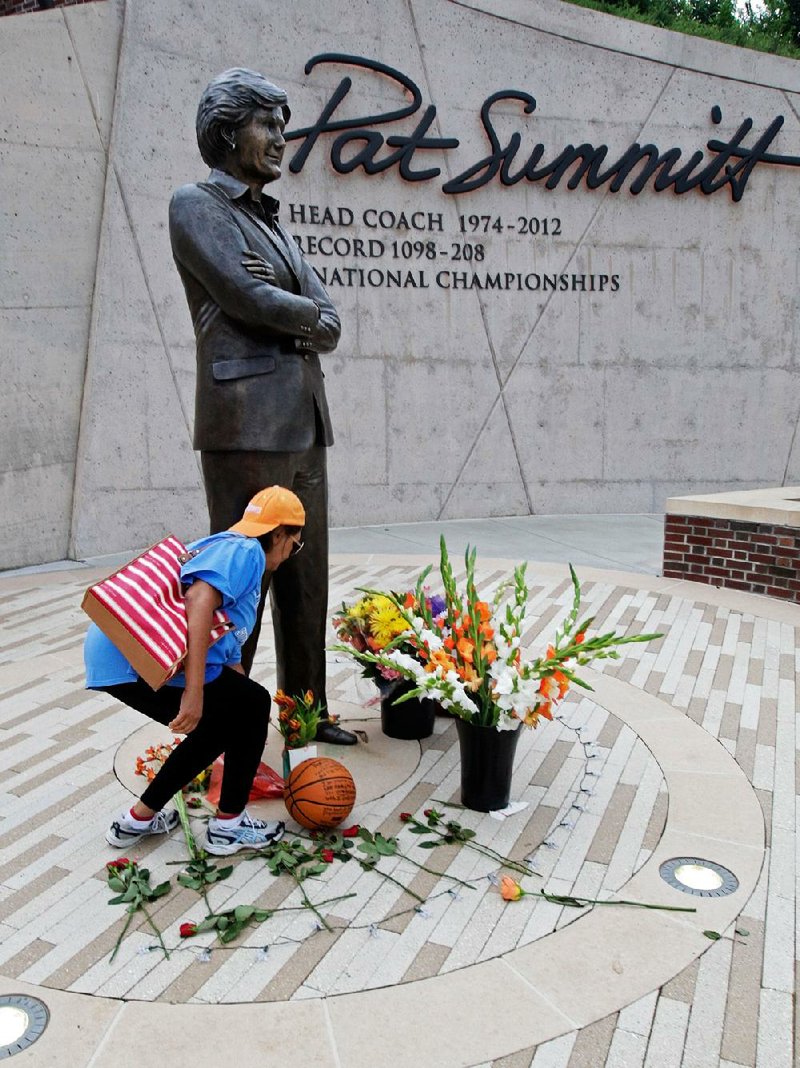Pat Summitt, who won eight women's national basketball championships at the University of Tennessee and more games than any other Division I college coach, male or female, died Tuesday. She was 64.
Her death was confirmed on the website of the Pat Summitt Foundation.
WHAT THEY’RE SAYING
On the passing of Pat Summitt
“One would be hard-pressed to name a figure who had a more indelible impact on her profession than Pat Summitt.”
Geno Auriemma, Connecticut women’s basketball coach
. . .
“I can’t even imagine where our game would be without Pat Summitt. Her legacy will be the impact that she has had on us all. It extends beyond her Lady Vol family, and includes any of us who have competed on every level.”
Gary Blair, Texas A&M women’s basketball coach and former Arkansas women’s coach
. . .
“I always said Pat Summitt could have coached any sport on the Vol campus, and she would have won a championship. She just knew how to win.”
Jimmy Dykes, Arkansas women’s basketball coach
. . .
“She was something like a superhero to me. In the face of adversity, she never showed weakness, she never backed down.”
Chamique Holdsclaw, former Tennessee player
. . .
“Pat Summitt is a pioneer in basketball. Her amazing career accomplishments are among an elite group of leaders. Very few people leave a lasting legacy in their chosen professions, and Coach Summitt has done just that at the University of Tennessee and in women’s basketball.”
Mike Krzyzewski, Duke men’s basketball coach
. . .
“It would have been a great experience to play for her. She could have coached any team, any sport, men’s or women’s. It wouldn’t have mattered because Pat could flat out coach. I will miss her dearly, and I am honored to call her my friend.”
Peyton Manning, former Tennessee and NFL quarterback
. . .
“A great person, loving mother, passionate coach and loyal friend.”
Phillip Fulmer, former Tennessee football coach
. . .
“Dead at 64? That’s five years younger than Duke’s Mike Krzyzewski. Seven years younger than Syracuse’s Jim Boeheim. One year younger than North Carolina’s Roy Williams. Eleven years younger than SMU’s Larry Brown. And Summitt was just one year older than Louisville’s Rick Pitino and three years older than Michigan State’s Tom Izzo. Those fellow Naismith Hall of Famers are all still operating at a high level. Summitt should be, too.”
Gary Parrish, CBSSports.com
. . .
“It hurts. This whole situation has been very difficult. She meant a lot to me. She was a teacher on and off the court. It was an opportunity and a blessing to play for her. She really helped me grow up and become a woman.”
Shekinna Stricklen, former Morrilton High School and Tennessee player
. . .
“We lost one of the true giants in coaching, in any sport and regardless of gender, today. If there were a Mount Rushmore of coaching, Pat Summitt would certainly be included.”
Roy Williams, North Carolina men’s basketball coach
Summitt’s year-by-year record
SEASON RECORD POSTSEASON
1974-1975 16-8 Did not qualify
1975-1976 16-11 Did not qualify
1976-1977 28-5 AIAW semifinals
1977-1978 27-4 AIAW regional first round
1978-1979 30-9 AIAW semifinals
1979-1980 33-5 AIAW runner-up
1980-1981 25-6 AIAW runner-up
1981-1982 22-10 NCAA semifinals
1982-1983 25-8 NCAA regional final
1983-1984 23-10 NCAA runner-up
1984-1985 22-10 NCAA regional semifinal
1985-1986 24-10 NCAA semifinals
1986-1987 28-6 NCAA champion
1987-1988 31-3 NCAA semifinals
1988-1989 35-2 NCAA champion
1989-1990 27-6 NCAA regional final
1990-1991 30-5 NCAA champion
1991-1992 28-3 NCAA regional semifinal
1992-1993 29-3 NCAA regional final
1993-1994 31-2 NCAA regional semifinal
1994-1995 34-3 NCAA runner-up
1995-1996 32-4 NCAA champion
1996-1997 29-10 NCAA champion
1997-1998 39-0 NCAA champion
1998-1999 31-3 NCAA regional final
1999-2000 33-4 NCAA runner-up
2000-2001 31-3 NCAA regional semifinal
2001-2002 29-5 NCAA semifinals
2002-2003 33-5 NCAA runner-up
2003-2004 31-4 NCAA runner-up
2004-2005 30-5 NCAA semifinals
2005-2006 31-5 NCAA regional final
2006-2007 34-3 NCAA champion
2007-2008 36-2 NCAA champion
2008-2009 22-11 NCAA first round
2009-2010 32-3 NCAA regional semifinal
2010-2011 34-3 NCAA regional final
2011-2012 27-9 NCAA regional final
TOTALS 1,098-208 Eight national titles
SUMMITT BY THE NUMBERS
Olympic medals (gold, silver) 2•
NCAA coach of the year awards 7•
National championships 8•
Final Four appearances 18•
All-Americans coached 21•
NCAA Tournament appearances 31•
Seasons coaching at Tennessee 38•
NCAA Tournament victories 112•
Career winning percentage.841•
Career victories 1,098•
Summitt stepped down after 38 seasons and 1,098 victories at Tennessee in April 2012, at 59, less than a year after she learned she had early onset Alzheimer's disease.
Over nearly four decades, Summitt helped transform women's college basketball from a sport ignored by the National Collegiate Athletic Association into one that drew national television audiences and paid its most successful coaches more than $1 million a year.
"In modern history, there are two figures that belong on the Mount Rushmore of women's sports -- Billie Jean King and Pat Summitt," Mary Jo Kane, a sports sociologist at the University of Minnesota, said in 2011. "No one else is close to third."
Summitt, who was inducted into the Women's Basketball Hall of Fame in 1999 and the Naismith Memorial Basketball Hall of Fame in 2000, was a trailblazer, ambassador and missionary. She was a co-captain of the 1976 women's Olympic team, which won a silver medal, then guided the United States to gold as head coach at the 1984 Games in Los Angeles. All of her players who completed their eligibility at Tennessee also graduated, school officials said.
She was born Patricia Sue Head on June 14, 1952, in Clarksville, Tenn. The fourth of five children, she slept in a baby bed until she was 6. Her farmer father, Richard Head, was a disciplinarian who, she recalled, admonished his children that "cows don't take a day off."
During the day, she joined her three older brothers in baling hay and chopping tobacco. At night, she played basketball against her brothers and neighbors.
"I was the only girl," Summitt once said. "They beat me up, but it made me tougher."
Title IX, the federal law that prohibited discrimination in schools based on gender, was passed in 1972, but expanded opportunities for female athletes came haltingly. The NCAA did not begin sponsoring women's basketball until 1982, 43 years after it held its first postseason tournament for men.
Still, the women's game thrived in rural enclaves in states such as Tennessee and Texas, where girls who worked on farms could not be told with any seriousness that they lacked the endurance to play sports.
Summitt attended the University of Tennessee at Martin and, upon graduating in 1974, became head coach at the University of Tennessee's flagship campus in Knoxville. At 22, she was barely older than her players.
Summitt's first game at Tennessee ended in a one-point defeat. When she phoned her parents to give them the news, she recalled, her father offered a bit of sage advice: "Tricia, don't take donkeys to the Kentucky Derby" -- meaning that the best coaches recruited the top players. For most of 38 seasons, she did.
Her two biggest stars, Chamique Holdsclaw of Queens, N.Y., and Candace Parker of suburban Chicago, led the Lady Vols to five of Summitt's eight national titles and are considered two of the best women's collegiate players of all time. Summitt's best team, guided by Holdsclaw and reliant on relentless offense and aggressive defense, finished 39-0 to win the national title in 1998. To that point, no women's team had won as many games in a season.
As the number of championships climbed, so did Summitt's salary, eventually reaching $1.25 million a year. She was once approached by Tennessee officials about coaching the men's team. She dismissed the overture, asking, "Why is that considered a step up?"
Summitt's marriage of 27 years to R.B. Summitt, a banker, ended in divorce in 2008.
Summitt's eighth and final national title also came in 2008, three short of the 11 titles won by Geno Auriemma, who coaches the Connecticut women's team.
Summitt began to notice changes in herself during the 2010-11 season: She grew forgetful during games; she lost track of meetings. After the season, she visited the Mayo Clinic, and doctors found that she had early onset Alzheimer's.
Summitt coached through the 2011-12 season, though her three assistant coaches assumed most of her duties during practices and games. The Lady Vols struggled at times but still came within one victory of reaching the Final Four. Shortly after the season ended, Summitt retired as head coach. She started a foundation to raise awareness about dementia.
Her memoir, Sum It Up (written with Sally Jenkins), was a best-seller in 2013.
Her survivors include her son, Tyler, who was the women's coach at Louisiana Tech before resigning this year over what was described as "an inappropriate relationship," widely reported to be with one of his players; her mother, Hazel Albright Head; her sister, Linda Atteberry; and her brothers, Kenneth, Tommy and Charles Head.
Sports on 06/29/2016



